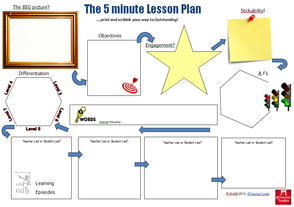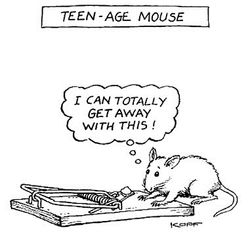
| the_5_minute_lesson_plan.docx |
| 5_minute_rq.jpg |
| "SHOULD WE BE EDUCATING YOUNG PEOPLE FOR OUR PAST OR THEIR FUTURE?" |
 Have you tried the 5 minute lesson planner from Ross McGill at TeacherToolkit? It has been viewed more than 300,000 times on the TES website (http://www.tes.co.uk/teaching-resource/The-5-Minute-Lesson-Plan-by-TeacherToolkit-6170564/) and allows planning to efficiently cover important key areas of a lesson. Why not give it a go? Click on the link below for the Word version:
And here is one that was used in a Form IV IGCSE Year 2 Economics class at Newton. The class went very well, particularly as the lesson plan was a constant reminder of next steps, important key words, AFL, etc:
0 Comments
 Teachers – The 10 Stages of Twitter
(Taken from http://dedwards.me/) Stage 1- Sign up to twitter following persuasion/pestering by colleagues. Follow Lady Gaga a famous sportsman/popstar and a news channel. Read a few tweets, don’t understand what the fuss is about and mock anyone who uses twitter. Stage 2 - Overhear colleagues chatting about twitter and a great article they found. Promise to give it a go again and follow two or three recommendations. Find articles interesting and wonder how to get more. Nervously ask colleagues for help/who to follow and start to visit timeline a couple of times a week. Stage 3 - Think about posting first tweet. In an act of tremendous bravery write: ‘My first tweet, wondering what this twitter thing is all about?’ Sit waiting for a response – feel unloved. Stage 4 - Upon realising you have no followers ask colleagues how to get them? Watch ‘how to’ video on youtube and receive follows from a few educators – strangely Lady Gaga remains uninterested. Stage 5 - Have a mini twitter conversation with colleague, even retweet a couple of statements. Forget the @name and wonder why they don’t reply to your last question. Back to ‘how to’ video and sob quietly when the word hashtag is mentioned. Stage 6- Practise a couple of tweets that include @names and hashtags. Compare with other tweets on timeline and finally send. Remember to click on hashtag to see other comments. Feel proud that you chose the #edchat timeline and impressed with the amount of followers some people have – decide to follow them. Stage 7- Retweet any link you find interesting as people might read them. Begin to interact with ‘tweeps’ you have never met and who seem keen to help you. Discover they are prepared to share resources that may be of interest and tell them how great they are. Begin to tweet articles you find on the internet. Enjoy the responses. Comment how lovely people are. Followback anyone that follows. Actively search for new people to follow (partly so they will return the favour). Stage 8 - Thank colleagues for introducing you to twitter, impressed with the knowledge you have gleaned and your growing number of followers. Spread the word amongst friends and fellow educators. React badly when partner points out a mild addiction and a crick in your neck. Tweet how ridiculous it is that people aren’t on twitter. Join in weekly twitter chats using education hashtags. Stage 9 - Reflect that twitter is an incredibly positive place and everyone is full of praise. Realise there is a need to filter information and make own judgements. Start a blog to better communicate ideas and tweet to garner opinion. Understand that the more you interact with followers the more honest the feedback. Direct message to your heart’s content. Use the phrase ‘twitter is the best staffroom/cpd in the world’ on numerous occasions. Stage 10 (the reason for this post)- When seeking opinion from a range of people, ask followers to respond. Begin a twitter chat that not only informs but provokes fresh debate and develops your idea. Wonder what you ever did before twitter?  Month 1 - The Teenage Brain: please access the resources in the "Share Point" from the Newton email page. Take a read from the powerpoints, articles and documents there about the brain. Think deeply about what you have read during those precious quiet moments of the week. Then, we get together to exchange ideas and discuss the teenage brain and its obvious impact on learning.
"The brain is a biological system, not a machine. Currently we are putting children with biologically shaped brains into machine-oriented schools. The two just don't mix. We bog the school down with a curriculum that is not biologically feasible." p11, Teachers Toolkit, Paul Ginnis | |||||